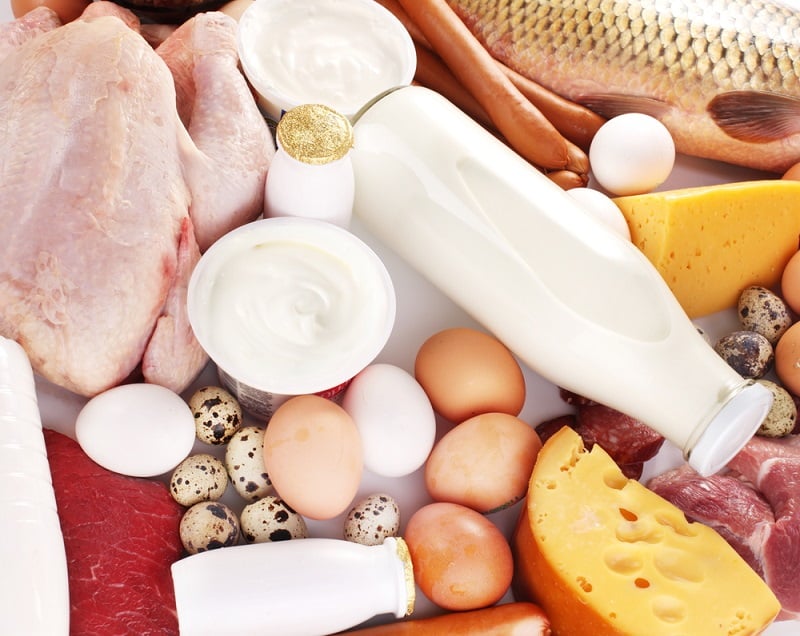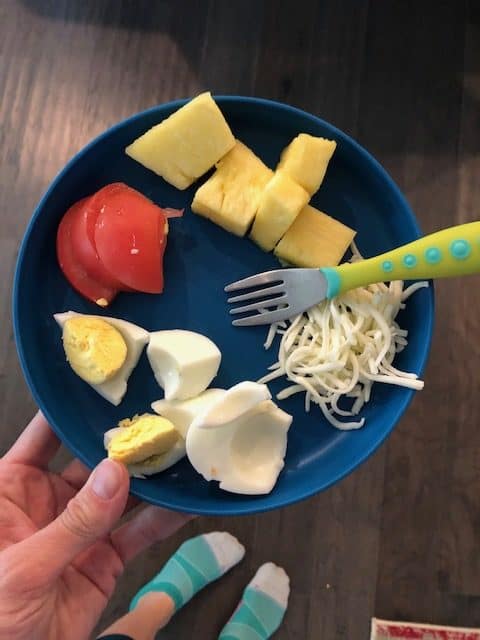Eggs For Kids and Brain Health
- September 19, 2023
- Last Updated: June 14, 2024
- 0 Comments
- Nutrition
Eggs are a powerhouse food for everyone. Packed with protein, antioxidants, and other essential nutrients, eggs are the perfect food for any meal. But did you know that eggs are also great for developing brains? This post will talk all about eggs for kids and brain health.
This post is sponsored by the NC Egg Association. All thoughts and opinions are my own.
Eggs are one of the most versatile sources of protein you can include in your diet.
You can eat them scrambled (or in a breakfast scramble), fried, hard-boiled, poached, deviled, and more.
Plus, they play a role in the structure of classics, like corn fritters, baked oatmeal and pasta bakes.

Not only do eggs taste delicious, but they are loaded with nutrients.
While adults can certainly benefit from the nutrients that are found in eggs, they are also an ideal food for kids. Egg nutrition is for everyone!
So much growth happens during those first few years of childhood.
One day you’re holding a newborn baby, considering baby led weaning vs. purees, and then poof, you have an energetic toddler with opinions on your hand.
Before you know it, they’re off to school and your back to school snacks game is strong!

While we tend to think of growth as predominantly physical growth, so much mental and cognitive growth is happening, too.
Your child’s brain is constantly growing and learning new things. And, diet and lifestyle play a big role in that.
Eggs contain multiple nutrients that support your child’s ability to learn and make brain connections.

Read on to find out why breakfast is essential for kids, why they should have protein, and how eggs impact brain development.
Let’s get cracking!

Eggs for Kids and The Importance of Breakfast
Do your kids wake up with an abundance of energy? Mine sure do!
After a good night’s rest, kids are usually ready to hit the ground running. Whether you’ve had your morning coffee (or coffee protein smoothie) or not.
Children learn by exploring their surroundings. Your child needs breakfast to fuel that exploration.
There’s nothing like a filling breakfast to start the day off right. Best of all, eggs provide a great food activity for toddlers, too!
We have used them for counting, and I love having kids mix them and see how the egg whites and yolks mix together.
Whether you do or don’t include dairy, eggs can be delicious with or without cheese. If dairy-free, try these dairy free snacks for babies.

Research has proven time and time again that breakfast is important. Here are some of my favorite key points about breakfast.
- Breakfast eaters have better diet quality overall.
- Breakfast has been shown to improve cognitive performance, enhance academic achievement, boost quality of life, promote well-being, and decrease disease risk factors.
- If that isn’t enough, this review concluded that breakfast had an immediate benefit on children when doing tasks requiring attention, executive function, and memory. All things required for a successful school day!
Bottom line: Breakfast is necessary for optimal brain power and learning.
The bottom line is – breakfast is necessary for optimal brain power and learning.
Whether memorizing shapes and colors, the ABCs, or the Pythagorean Theorem, your child’s brain needs fuel, and eggs can provide that for kids.
What you feed your child makes a difference.
The cognitive benefits occur when your child has a stable blood glucose, meaning some food with healthy fats and protein for sustenance.
It’s recommended that eggs be introduced early to prevent an egg allergy.
And because they are easy to grab, they make for the perfect baby-led weaning food, like these egg muffins for baby.
On top of that, eggs contain zero sugar. This is great news, especially for babies.

Protein for kids
When you eat carbohydrates that are quickly digested, like sugary cereal, or white toast on its own, blood glucose levels spike and rapidly drop.
This roller-coaster effect is not the best for focus and learning, especially in little ones.
Instead, when carbohydrates are combined with protein and fat, digestion slows and blood sugars rise more evenly.
Protein for breakfast is equally important for adults! Protein is an essential macronutrient that promotes the muscle growth your child experiences as they develop.

Eggs are a complete source of protein.
To make your child’s meal satisfying and more filling, you can easily add eggs.
There are 6 grams of protein in just one egg, making them a great protein idea for kids lunches.
Egg Recipes for Kids
If your kids are hungry an hour after eating breakfast, try one of the following for breakfast:
- egg and cheese sandwiches – you can serve these on toast, english muffins, bagels, or even tortillas!
- breakfast scramble with toast
- Sweetpotato zucchini muffins
- PB2 cookies
- hard-boiled eggs with toast or sweetpotato pancakes
- french toast with some fruit or yogurt
- Leftover oatmeal cookies
- egg muffins, which are great for on the go!
- pair a hard boiled egg with any of these healthy toddler breakfast ideas
- Asparagus quiche (great way to get veggies in too!)
Eggs provide so many options for meals and snacks!

Eggs for Brain Health
Are eggs good for the brain?
Absolutely!
As previously mentioned, the childhood years are prime time for brain development.
Your child is learning all about language, their surroundings, handling emotions, executive functioning and decision making, and more.

Children are constantly making connections and learning new things. Their ability to absorb information is astounding. And diet matters.
Are you looking for a simple way to improve your child’s diet quality?
Eggs make an awesome and easy addition to the diet to pack in the necessary nutrients to aid in brain development.

Choline and brain development
Choline is a nutrient used by the nervous system and brain to aid in muscle control, boost mood, and regulate memory.
It is well-supported that choline is an important nutrient for normal brain development and cognitive functioning – Especially during the first 3 years of life!
Given that 90% of Americans don’t get enough choline, eggs should move to the front of the class.
Each egg contains 125 mg of choline, which almost meets the daily intake for little ones under age 4.
The following table shows the recommended daily intake of choline:
| Age | Male | Female | Pregnancy | Lactation |
|---|---|---|---|---|
| Birth to 6 months | 125 mg/day | 125 mg/day | ||
| 7–12 months | 150 mg/day | 150 mg/day | ||
| 1–3 years | 200 mg/day | 200 mg/day | ||
| 4–8 years | 250 mg/day | 250 mg/day | ||
| 9–13 years | 375 mg/day | 375 mg/day | ||
| 14–18 years | 550 mg/day | 400 mg/day | 450 mg/day | 550 mg/day |
| 19+ years | 550 mg/day | 425 mg/day | 450 mg/day | 550 mg/day |
Furthermore, choline is an essential nutrient, meaning that our bodies can’t produce it in sufficient amounts so we must get it through our diets.
Eggs make it easy to meet the recommended amount of choline in people of all ages. Even babies.
Lutein and Brain Development
Eggs aren’t just a great source of protein and choline, but they also contain the antioxidants zeaxanthin and lutein.
These potent antioxidants are involved in many of the body’s functions, including aiding in eye health and brain development.

Antioxidants help fight oxidative stress and damage that occur on a daily basis.
Diets rich in antioxidants provide many health benefits, such as cancer protection, heart health, diabetes prevention, and improved mental health.
The brain is one of the body’s most complex and rapidly growing organs, particularly early in life. Lutein is a dietary compound that helps your child’s brain develop.
Egg yolks are a significant source of lutein. One more reason to make eggs a priority in your child’s diet.
Eggs are more than a breakfast food
Of course, you’re not just limited to having eggs at breakfast. You really can eat eggs any time of day.
Since they provide such an easy protein boost to any meal or snack, we always keep them on hand, along with my favorite pantry staples.
They are budget-friendly and helpful for so many recipes – having them on hand is the first step to eating more of them.

I love to keep hard-boiled eggs in the fridge for a ready-made protein snack for myself and for the kiddos.
They make a great addition to kids’ lunches, and since they’re so portable, they are also great to have for road trip snacks!
We also love eggs in our baby meatballs and toddler muffins to boost the nutrient profile. I also love to make sweet potato casserole on the weekends.
For more creative egg recipes, check out the North Carolina Egg Association’s recipe page.

In summary, eggs are full of brain-enhancing nutrients that are essential for people of all ages.
Your child can benefit greatly from eggs at any time of day.
A great source of highly absorbable protein, eggs have the staying power to keep your child full, boost brainpower, support memory, mood and more.
References:
- Giménez-Legarre N, Flores-Barrantes P, Miguel-Berges ML, Moreno LA, Santaliestra-Pasías AM. Breakfast Characteristics and Their Association with Energy, Macronutrients, and Food Intake in Children and Adolescents: A Systematic Review and Meta-Analysis. Nutrients. 2020;12(8):2460. Published 2020 Aug 15. doi:10.3390/nu12082460
- Lundqvist M, Vogel NE, Levin LÅ. Effects of eating breakfast on children and adolescents: A systematic review of potentially relevant outcomes in economic evaluations. Food Nutr Res. 2019;63:10.29219/fnr.v63.1618. Published 2019 Sep 12. doi:10.29219/fnr.v63.1618
- Adolphus K, Lawton CL, Champ CL, Dye L. The Effects of Breakfast and Breakfast Composition on Cognition in Children and Adolescents: A Systematic Review. Adv Nutr. 2016;7(3):590S-612S. Published 2016 May 16. doi:10.3945/an.115.010256
- Sünram-Lea SI. Breakfast, Glycemic Index, and Cognitive Function in School Children: Evidence, Methods, and Mechanisms. Nestle Nutr Inst Workshop Ser. 2019;91:169-178. doi:10.1159/000493708
- Derbyshire E, Obeid R. Choline, Neurological Development and Brain Function: A Systematic Review Focusing on the First 1000 Days. Nutrients. 2020;12(6):1731. Published 2020 Jun 10. doi:10.3390/nu12061731
- Kakieu Djossi S, Khedr A, Neupane B, Proskuriakova E, Jada K, Mostafa JA. Food Allergy Prevention: Early Versus Late Introduction of Food Allergens in Children. Cureus. 2022;14(1):e21046. Published 2022 Jan 9. doi:10.7759/cureus.21046
- Bernstein PS, Li B, Vachali PP, et al. Lutein, zeaxanthin, and meso-zeaxanthin: The basic and clinical science underlying carotenoid-based nutritional interventions against ocular disease. Prog Retin Eye Res. 2016;50:34-66. doi:10.1016/j.preteyeres.2015.10.003
- Gazzolo D, Picone S, Gaiero A, et al. Early Pediatric Benefit of Lutein for Maturing Eyes and Brain-An Overview. Nutrients. 2021;13(9):3239. Published 2021 Sep 17. doi:10.3390/nu13093239
- Saini RK, Prasad P, Lokesh V, et al. Carotenoids: Dietary Sources, Extraction, Encapsulation, Bioavailability, and Health Benefits-A Review of Recent Advancements. Antioxidants (Basel). 2022;11(4):795. Published 2022 Apr 18. doi:10.3390/antiox11040795
Support Bucket List Tummy









Like This Content?
Support Bucket List Tummy